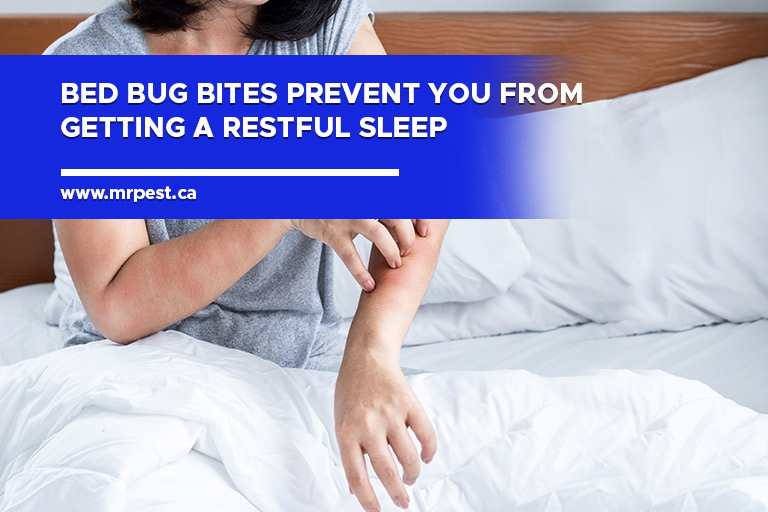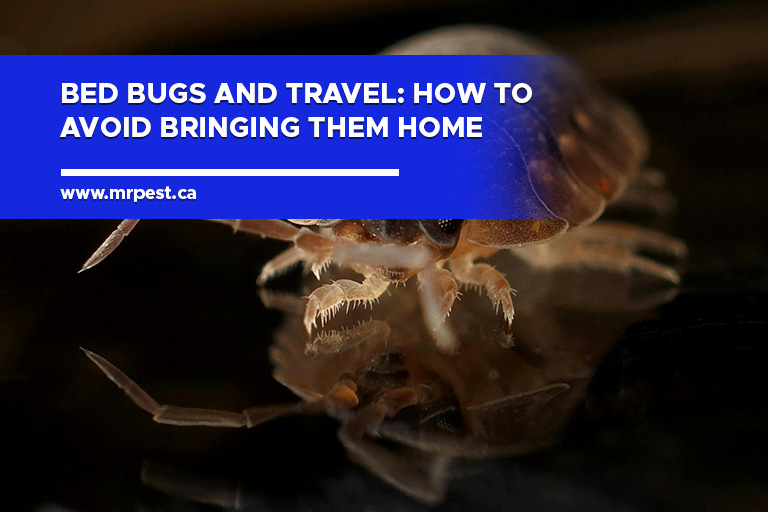When it comes to travelling, one of the last things you want to bring back with you is an unwanted souvenir in the form of bed bugs. These tiny pests have become a common problem in various travel accommodations, including hotels, motels, and vacation rentals. To ensure you don’t fall victim to bed bug infestations during your travels. Get rid of beg bugs in your luggage to prevent bringing them back to your home in Collingwood, it’s essential to be informed and take proactive measures.
In this guide, we will delve into bed bugs, their risks while travelling, and effective strategies for bed bug prevention while on the road.
Identifying Bed Bugs
Before we explore how to avoid bed bugs when travelling, it’s crucial to look for signs of bed bugs. Bed bugs are tiny, reddish-brown pests that feed on human and animal blood. They are known for their flat, oval-shaped body. While incapable of flight, they excel as hitchhikers, readily hiding in luggage, clothing, and personal belongings.
Common Signs of Bed Bug Infestations
To avoid bed bugs during your travels, keep an eye out for the following signs that may indicate an infestation in your accommodations:
- Visible Bugs: Check the seams, crevices, and folds of mattresses, headboards, and furniture for live bed bugs or their shed exoskeletons.
- Bloodstains: Look for small, reddish-brown stains on bedding and furniture, which may be a result of crushed bed bugs.
- Tiny Black Dots: These are bed bug feces and may be found on sheets, pillowcases, or around their hiding spots.
- Unpleasant Odour: Some people describe the scent of bed bugs as sweet or musty. If you notice an unusual odour, investigate further.
Risks of Bed Bugs During Travel

While bed bugs themselves are not known to transmit diseases, their bites can cause itching, skin irritation, and discomfort. These bites often appear as small, itchy red welts and can lead to secondary infections if scratched. In addition to the physical discomfort, bed bug infestations can disrupt your travel plans and result in unexpected expenses.
To avoid bed bugs in luggage and the associated health and financial risks, it’s essential to take proactive steps to prevent their presence during your trip. Here are some key points to consider:
- Bed bug bites can cause itching, skin irritation, and discomfort.
- Scratching bed bug bites can lead to secondary infections.
- Bed bug infestations can disrupt travel plans.
- Infestations may result in unexpected expenses, such as replacing luggage and clothing.
- Proactive prevention measures are crucial to mitigate these risks during your trip.
How Bed Bugs Spread
Understanding how bed bugs can be inadvertently transported is essential for effective bed bug prevention while travelling. Bed bugs are notorious hitchhikers and can spread in various ways:
- Luggage: Bed bugs often crawl into luggage, backpacks, or suitcases left on infested surfaces or near hiding spots.
- Clothing: They can also hide in clothing and personal items, such as jackets, shoes, and purses.
- Public Transportation: Bed bugs may infest buses, trains, and airplanes, increasing the risk of exposure during your journey.
- Shared Accommodations: Staying in places with high guest turnover, such as hotels and hostels, can increase the chances of encountering bed bugs.
Preventing Bed Bugs While Travelling
Now that you understand the risks of bed bugs during travel and how they spread, let’s explore practical steps to avoid bed bugs when travelling and prevent bringing them home.
Pre-Travel Preparation
When it comes to avoiding bed bugs during your travels, preparation is key. Here are some essential steps you can take to ensure you are well-prepared:
- Packing Strategies
Opt for hard-shell luggage with sealed zippers as your first line of defense. Bed bugs find it more challenging to infiltrate such luggage, reducing the risk of them hitching a ride. Additionally, consider using sealed plastic bags or packing cubes to create an extra barrier between your clothing and potential bed bug hiding spots within your luggage.
- Inspect Luggage
Before departing from your accommodation, set aside some time for a thorough luggage inspection. Pay close attention to the seams, pockets, and folds of your bags. The goal is to ensure that no uninvited bed bug guests have stowed away among your belongings. Vigilance at this stage can save you from unwanted surprises down the road.
- Choose Accommodations Wisely
Before booking your accommodations, invest some time in research. Read reviews from previous guests to check for any mentions of bed bug infestations in the location. Keep in mind that even reputable establishments can face occasional bed bug issues, but multiple recent reports might be cause for concern. By choosing accommodations wisely, you can reduce the likelihood of encountering bed bugs during your stay. Your peace of mind and a bed bug-free trip are well worth the effort.
During Your Stay
1. Hotel Room Inspection
Upon your arrival at your destination, it’s essential to conduct a thorough inspection of your hotel room or rental property for any potential signs of bed bugs. This step is a critical part of your bed bug prevention strategy, as early detection can help you address the issue promptly. Here’s what you should do:
- Inspect Mattress Seams: Begin your inspection by carefully examining the seams and creases of the mattress. Bed bugs often hide in these areas, and you may spot live bugs, shed exoskeletons, or tiny black dots, which are their feces.
- Check Headboards and Furniture: Bed bugs can also hide in headboards, bed frames, and nearby furniture. Use a flashlight to illuminate these areas and look for any signs of bed bug activity.
- Promptly Notify Management: If you detect any signs of bed bugs during your inspection, it’s crucial to notify the management or property owner immediately. They should be informed of your concerns so they can take appropriate action, such as arranging for an inspection and treatment if necessary.
2. Keep Luggage Off the Floor:
Once you’ve completed your room inspection and are satisfied that it’s free from bed bugs, it’s time to unpack and settle in. However, it’s essential to continue taking precautions to prevent bed bugs from hitching a ride with you. Here’s what you should do:
- Use Luggage Racks: Most hotel rooms provide luggage racks or stands for your convenience. Utilize these racks to keep your bags off the floor. Elevating your luggage makes it more challenging for bed bugs to climb into your belongings.
- Avoid Upholstered Surfaces: While it may be tempting to place your bags on the bed or a soft, upholstered chair, it’s best to avoid these surfaces. Instead, opt for hard, non-upholstered areas like tabletops or the luggage racks.
3. Isolate Dirty Laundry
During your trip, you’ll accumulate used clothing and bedding that may be exposed to various environments. To prevent bed bugs from getting into your dirty laundry and potentially infesting your belongings, follow these steps:
- Use Sealed Plastic Bags: Carry a supply of sealed plastic bags or large resealable plastic containers in your luggage. Place your used clothing and bedding inside these sealed bags to create a barrier that prevents bed bugs from gaining access.
- Utilize a Laundry Hamper: If your accommodations offer a laundry hamper, make use of it to store your dirty laundry. Ensure that it has a secure lid or cover to keep bed bugs out.
Post-Travel Actions
After your journey, it’s crucial to take thorough post-travel actions to ensure that you don’t inadvertently bring any bed bugs into your home.
- Unpack Outside
When you return home, it’s advisable to unpack your luggage outside, if possible. This precaution helps prevent any potential bed bugs from making their way into your living space.
- Wash and Dry Clothing
Once you’ve unpacked, make sure to launder all the clothing and bedding you used during your trip. Use hot water and high heat settings in the dryer to effectively kill any potential bed bugs that might have taken refuge in your clothing or linens.
- Inspect and Vacuum Luggage
Before storing your luggage, take the time to thoroughly inspect it. Pay special attention to seams, pockets, and any folds where bed bugs could hide. If you spot any signs of bed bugs or suspect their presence, don’t delay in taking action. Additionally, use a vacuum cleaner to meticulously clean the interior of your luggage. After vacuuming, it’s essential to dispose of the vacuum bag or empty the canister immediately, ensuring that any captured bed bugs are safely removed from your home environment.
Bed Bug Treatment and Reporting

If, despite your precautions, you suspect bed bugs have hitchhiked home with you, take action promptly. Do not attempt to treat the infestation on your own, as it can be challenging to eradicate bed bugs. Instead, it’s imperative to seek professional assistance:
- Contact a Professional
Reach out to a reputable pest control service in Collingwood for a thorough inspection and treatment plan tailored to your specific situation.
- Notify Accommodation
In addition to professional pest control, inform the accommodation where you stayed during your trip about the potential bed bug issue. This step is crucial to help them address the problem promptly and prevent future guests from encountering the same issue.
Taking these actions swiftly can make a significant difference in effectively addressing any potential bed bug infestation, ensuring your home remains bedbug-free, and contributing to the prevention of bed bugs in Collingwood and beyond.
Travel Tips to Avoid Bed Bugs
In addition to the specific strategies mentioned above, here are some general travel tips to help you avoid bed bugs while on the move:
- Use Bed Bug-Proof Encasements
Consider using bed bug-proof mattress and pillow encasements not only at home but also during your travels to provide an additional layer of protection against potential infestations.
- Inspect Second-Hand Purchases
When shopping for second-hand furniture or clothing, exercise caution and vigilance. Bed bugs can hide in these items, so inspect them thoroughly before bringing them into your home.
- Stay Informed
Stay updated on bed bug prevention tips and trends. Knowledge is your best defense against these pests, so educate yourself on the latest strategies to prevent bed bug infestations while travelling and at home. Remain vigilant during your travels, and if you suspect any signs of bed bugs in your accommodations, take immediate action to protect yourself and your belongings.
Being proactive and informed can significantly reduce the risk of bringing them home. By following the steps outlined on how to prevent bringing home bed bugs, you can enjoy your travels with peace of mind, knowing that you’ve taken the necessary precautions to avoid bed bugs in Collingwood and protect your home.
Remember, if you suspect a bed bug infestation at any point, don’t hesitate to contact a professional pest control service like Mr. Pest Control at 1-888-794-PEST(7378) to protect your home from these pesky critters. Safe travels!



